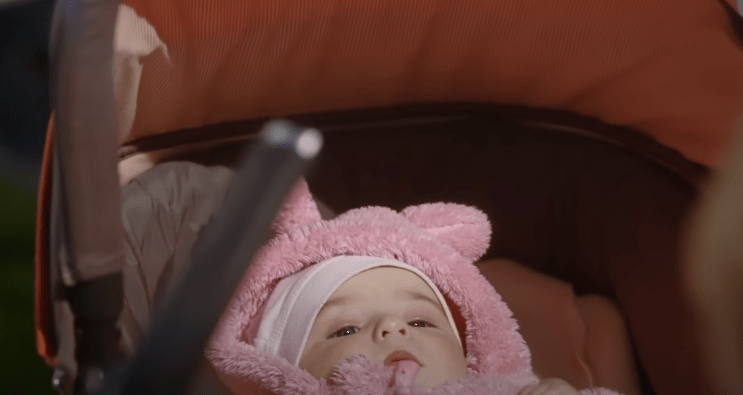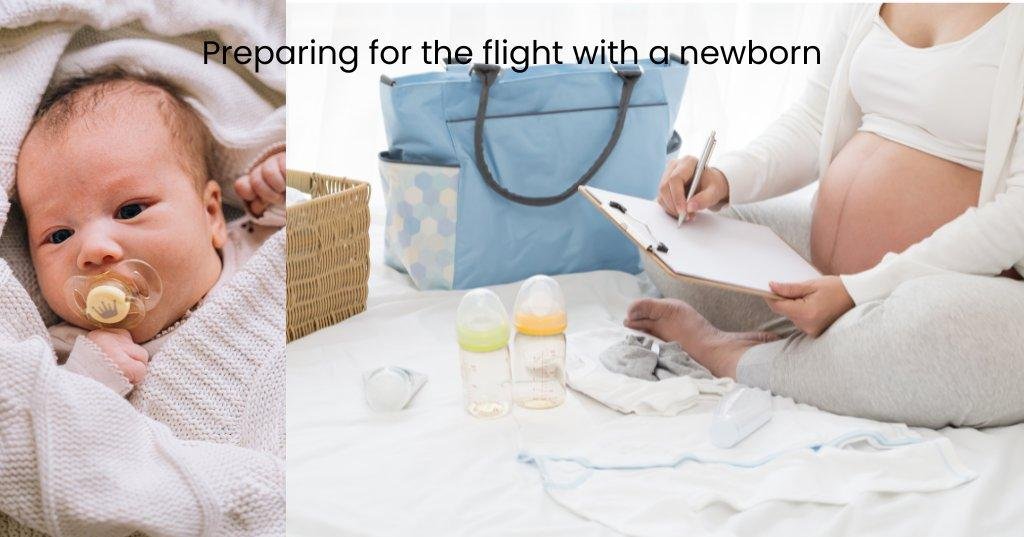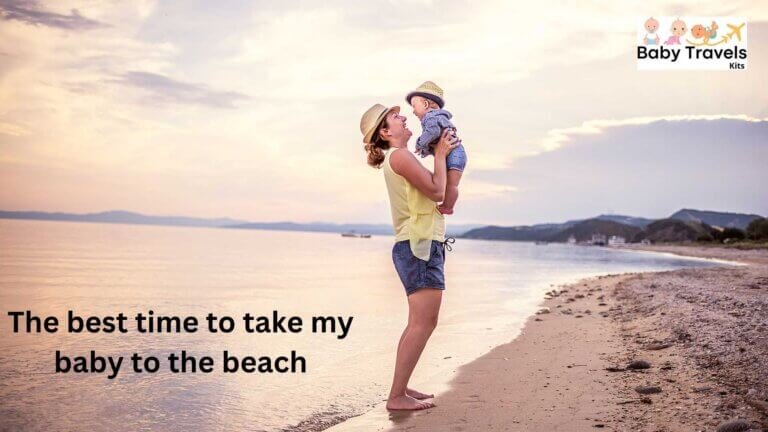Ready to embark on an unforgettable adventure with your newest addition? Travelling with a newborn can be exciting and nerve-wracking, but careful planning and preparation can also be a smooth and enjoyable experience. In this blog post, we’ll explore the ins and outs of travelling with a newborn by plane – from age recommendations to packing essentials and safety precautions. So buckle up (or should we say, buckle them up!) as we take off into the world of family travel! Whether you’re jetting off for a quick domestic getaway or considering an international voyage from India, we’ve got you covered. Let’s dive in!

What to consider before traveling with a newborn
Before you embark on your journey with a newborn, there are a few important factors to consider. It’s essential to consult with your pediatrician and get their approval before flying with your little one. They can assess if your baby is physically ready for air travel and provide any necessary recommendations.
Another crucial aspect to think about is the age of your newborn. While each child develops at their own pace, most pediatricians suggest waiting until the baby is at least two weeks old before taking them on a plane. This allows time for their immune system to strengthen and reduces the risk of potential complications during the flight.
Related: What are Good Hacks for Traveling with Babies / Toddlers on Long Flights?
Additionally, consider any health conditions or special needs your baby may have. If they were born prematurely or have respiratory issues, delaying air travel is advisable until they are older and more resilient.
The duration of the flight is another key consideration when traveling with a newborn. Shorter flights are generally more manageable as they involve less time in confined spaces and reduce exposure to potential germs.
Assess whether you feel comfortable handling various aspects of air travel while caring for an infant. Consider factors such as feeding schedules, diaper changes, soothing techniques, and how well you anticipate being able to manage these tasks in an unfamiliar environment like an aircraft cabin.
By carefully considering these elements before traveling by plane with a newborn, you can ensure a smoother journey for yourself and your precious bundle of joy!
Age recommendations from paediatricians
When it comes to traveling with a newborn by plane, one of the most important considerations is your baby’s age. Pediatricians recommend waiting until your baby is at least two months old before taking them on a flight. Their immune systems still develop during those first few weeks, making them more susceptible to infections.

At around two months old, babies have their first set of vaccinations, which help protect them against certain illnesses. However, every baby is different, and it’s always best to consult with your pediatrician before making travel plans.
It’s also worth noting that some airlines have specific age restrictions for infants flying on their planes. For example, certain airlines may require infants to be at least seven days old, while others may have stricter requirements.
The decision about when to travel with your newborn should be based on their health and development, and you should consult with your paediatrician for guidance.
Remember that air travel can be stressful for both you and your baby, so it’s important to consider all factors before embarking on a journey by plane.
Related: 5 Best Travel Booster Seats for Eating in 2024
Preparing for the flight with a newborn
Flying with a newborn can be an exciting but daunting experience. To ensure a smooth travel experience, taking some necessary precautions and making adequate preparations is important.
Check with your pediatrician if your baby is fit to fly. Most doctors recommend waiting until the baby is at least two months old before taking them on a plane. This allows their immune system to develop and reduces the risk of infections.

When booking your flight, choose a time that aligns with your baby’s sleep schedule. This will increase their chances of sleeping through most of the journey and minimize any potential fussiness.
Pack all essential items in your carry-on bag, such as diapers, wipes, extra clothes, blankets, bottles or breastfeeding supplies, pacifiers, and snacks, if applicable. It’s always better to be over-prepared than underprepared when travelling with little ones!
Consider bringing familiar items like toys or blankets that comfort your baby during the flight. These familiar objects can help soothe and make them feel more secure in an unfamiliar environment.
Ensure you have easy access to any medications or medical documents required for your infant during the flight. Remember to pack enough formula or breast milk for feeding throughout the journey.
Before boarding the plane, try feeding or burping your baby, as this can help prevent discomfort caused by air pressure changes during takeoff and landing.
Don’t forget about yourself! Take care of your needs by staying hydrated and comfortable throughout the journey. Dressing in layers may come in handy due to unpredictable cabin temperatures.
By preparing ahead of time and considering these tips, you’ll be better equipped to fly with a newborn – making it more enjoyable for you and your little one!
Tips for a smooth travel experience
Plan ahead:
When traveling with a newborn, planning your trip well is important. This includes booking your flights and accommodations early, ensuring you have all necessary documentation, and making arrangements for special assistance or services.
Choose the right time:
Consider scheduling your flight during your baby’s regular sleep or feeding times. This can help minimize disruptions and make the journey more comfortable for you and your little one.
Pack essentials in your carry-on:
Pack all essential items such as diapers, wipes, formula or breast milk (within allowed limits), extra clothes, blankets, pacifiers, and toys in your carry-on bag. Having these items easily accessible will make it easier to attend to your baby’s needs during the flight.
Dress comfortably
Opt for comfortable clothing that allows easy movement when carrying or nursing your baby on board. Layers are also recommended since aeroplane temperatures can fluctuate.
Be prepared for security checks:
Remember that you may need additional security screening procedures when traveling with a newborn. Be ready to remove liquids from bags and prepare any documentation airport staff requests.
Request bulkhead seating if possible:
Bulkhead seats offer more legroom, which can be beneficial when tending to a newborn during the flight.
Keep calm and stay flexible:
Traveling with a newborn may come with unexpected challenges or delays – try not to stress too much! Stay calm and be flexible, as things might not always go according to plan.
Remember that every child is different, so what works for one family may not work for another when it comes to travel experiences with a newborn by plane.
What to pack for the trip
Packing for a trip with a newborn can feel overwhelming, but with careful planning, you can ensure you have everything you need. Here are some essential items to consider packing:
Diapers and wipes:
Pack enough diapers to last the duration of your journey, including any potential delays or layovers. Don’t forget to bring along plenty of wipes for easy clean-ups.
Extra clothing:
Babies are notorious for unexpected messes and spills, so pack extra outfits in case of accidents. Remember to include layers in case the temperature fluctuates during your travels.
Blankets and swaddles:
A soft blanket or swaddle can help keep your baby cozy and comfortable during the flight or while waiting at the airport.
Feeding supplies:
If breastfeeding, don’t forget nursing pads and a cover if desired. For bottle-fed babies, pack enough formula or breast milk along with bottles, nipples, and a bottle brush.
Baby carrier or stroller:
Having a baby carrier or lightweight stroller can make navigating through airports much easier while keeping your little one close by.
Medications and first aid kit:
It’s always wise to have any necessary medications and basic first aid supplies such as band-aids and infant pain relievers.
Entertainment essentials:
Toys, books, pacifiers – whatever soothes your baby may be useful during long flights or layovers.
Remember that each airline has its regulations regarding infant baggage allowance, so check their specific policies before packing too heavily!
Safety precautions and regulations for flying with a newborn
Safety precautions and regulations for flying with a newborn are essential to ensure the well-being of your little one during air travel. Before you embark on your journey, it’s important to familiarize yourself with these guidelines.
Always consult with your pediatrician before travelling by plane with a newborn. They can provide valuable advice specific to your baby’s health and development. Additionally, most airlines have age restrictions for infants traveling without an adult or requiring certain medical equipment.
When packing for your trip, include essential items such as diapers, wipes, formula or breast milk (under airline regulations), extra clothing, blankets, and toys to keep your baby comfortable throughout the flight.
During the flight, follow all safety instructions the airline crew provides. Ensure you secure your baby in an FAA-approved car seat or use an infant carrier designed for air travel. Remember to buckle up both you and your child during takeoff, landing, and turbulence.
Be aware of any specific airport security procedures for traveling with a newborn. This may include additional screening processes or restrictions on carrying liquids through security checkpoints.
Adhering to these safety precautions and following airline regulations when flying with a newborn can help create a safer and more enjoyable travel experience for you and your little one.
Conclusion
Traveling with a newborn can be an exciting and rewarding experience, but it’s important to carefully consider various factors before embarking on your journey. Pediatricians generally recommend waiting until the baby is at least 2-3 months old before traveling by plane, as their immune systems still develop during the first few weeks of life.
When planning your trip, check the airline’s specific age requirements and follow any necessary documentation processes for international travel with infants. It’s also essential to prepare for the flight by packing all your baby’s essentials, including diapers, formula or breast milk, extra clothing, and comfort items like a favourite blanket or toy.
During the flight itself, there are several tips you can follow to ensure a smooth travel experience. Consider booking seats near the front of the aircraft for easier access to amenities and more legroom. Keep your baby comfortable and entertained with toys or pacifiers during takeoff and landing to help equalize pressure in their ears. Remember to pack enough supplies for unexpected delays or layovers.
Safety precautions should always be a top priority when flying with a newborn. Follow airline regulations regarding infant safety seats or bassinets if available. Ensure proper hand hygiene throughout the journey by carrying sanitizing wipes or hand sanitiser. Dress your baby in layers so you can easily adjust their clothing according to temperature changes onboard.
In conclusion (without using those words), while it is possible to travel internationally with a newborn by plane under certain conditions, it’s crucial to prioritize your child’s well-being and consult with pediatricians before making any decisions. By considering age recommendations from medical professionals, adequately preparing for flights, and following safety precautions diligently, travelling with peace of mind becomes achievable even when accompanied by our littlest travellers!





